Ruling the ice with an iron fist: The story of Russia’s first hockey enforcer
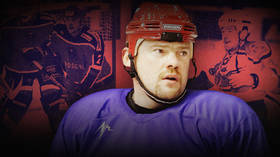
Fighting isn't welcome in the majority of sports, but ice hockey has always been different. Fist fights have come to occupy a special place as part of the action on the ice. And while in the modern era the sports authorities have cracked down, in the '80s and ‘90s a large number of fans headed to hockey arenas simply to see some good old-fashioned scraps – at least in North America.
Russian hockey, which became the successor to the Soviet 'academic' style of play, initially didn’t witness anything similar to the kind of brawls seen elsewhere, but there were two players, Andrei Nazarov and Alexander Yudin, who could equally claim the title of the first Russian 'enforcer'.
But while Nazarov built his fighting career on the ice in North America, Yudin made a name for himself at home. For 14 years, he ruled over the major Russian league without losing (at least significantly) a single fight. Here is his unique story.
The mean streets of Murmansk
Yudin was born on February 4, 1971, in Murmansk, the world’s largest city beyond the Arctic Circle. While it might not be the coldest place on the planet, the climate can be brutal and unforgiving; every year, from December to January, the city plunges into darkness as the polar nights set in and the sun doesn’t rise above the horizon. A certain severity of character should probably not come as a surprise for anyone growing up in such hostile conditions.
Yudin’s upbringing provided fertile ground for his fabled anecdotes about his past. Some are almost impossible to take at face value, although numerous notable hockey players around the country repeat them in detail, arguing that they aren’t even among the wildest things that Yudin may well have experienced in his colorful life.
One such legendary story was recounted by former USSR national team goaltender Alexei Ivashkin.
“When he was a kid he went bear hunting together with his father and grandfather,” recalled Ivashkin. “They wandered through the forest for a long time, but they could not track any animal. Alex, who was a little boy back then, got very tired. So they sat him on a tree branch and told him to relax and wait until they came back. They returned in a couple of hours – and stumbled upon a dead bear. It turned out that the animal had been walking around the tree, and at that very moment the little sleeping Alex fell right on his head, causing a heart attack.”
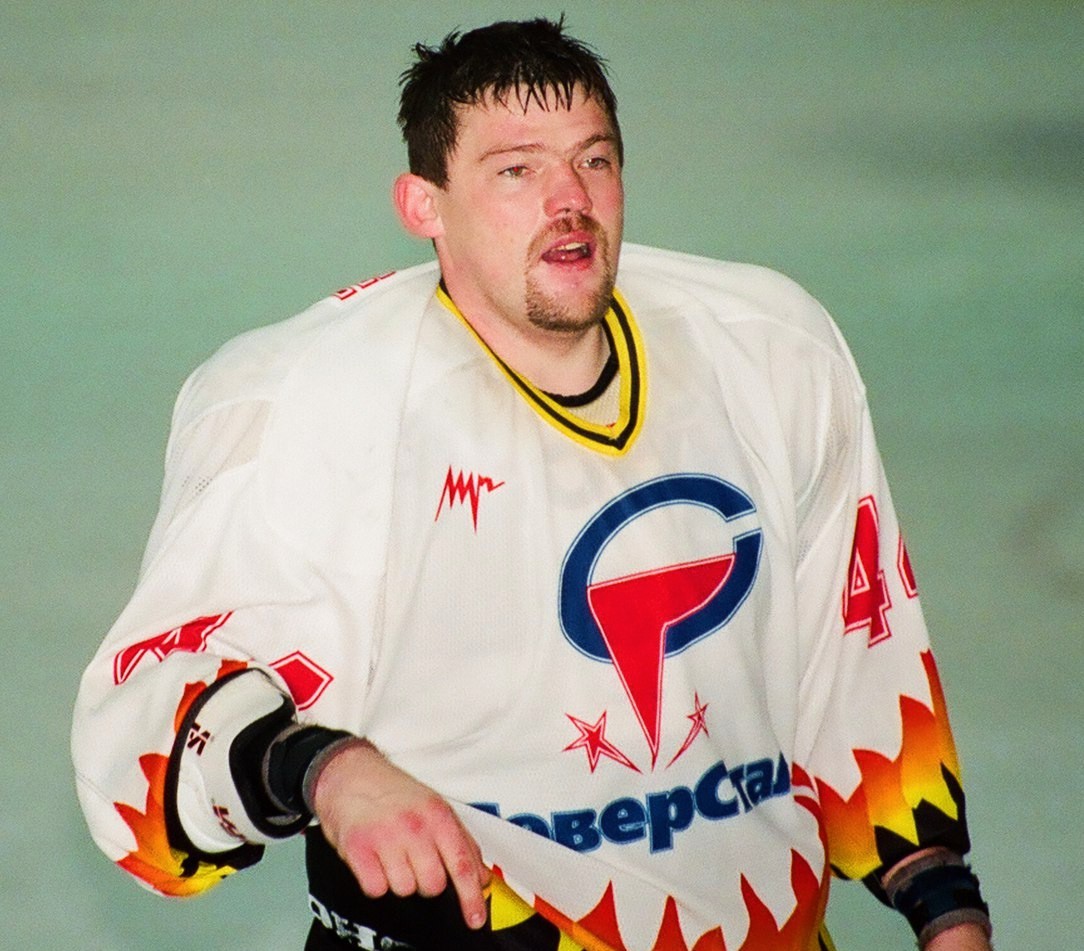
Growing up in Murmansk, Yudin received an induction into the school of hard knocks without even having to attend boxing lessons. The streets became the combat arena for this future enforcer, while his elder brother became his first coach. Together, Yudin and his sibling took part in ‘wall-to-wall’ fights for the first time, and soon began to participate in such showdowns almost every week. Nunchucks, heavy metal chains, and knives were not uncommon in the battles.
Perhaps unsurprisingly, Yudin's body bears the scar from a knife wound, but even this did not faze him from seeking out more challenges, instead making him feel almost invincible.
“Because I became the strongest, I wasn't afraid of anyone. By the way, I'm not an ice hockey enforcer, I am a street fighter. I can use anything during a fight – legs, elbows, knees, head,” Yudin himself recalls. “Street fighters are not afraid of anything. They immediately destroy, not talking much. And fights on the ice are generally elementary, in terms of the technique.”
‘The Barbarian’
It is notable that in the 1990s there was a distinct lack of enforcers in Russian hockey, marking out Yudin's behavior as even more defiant. His first serious fight on the ice turned into a high-profile scandal. During a Moscow derby game between arch rivals Spartak and Dynamo, Yudin attacked Dynamo forward Maxim Kuznetsov, who years later won the Stanley Cup with Detroit. Not only did Yudin ground his opponent, he continued to rain down blows. During the broadcast on the main national television channel, the behavior of the novice enforcer was labeled barbaric, while the press even called for Yudin to be thrown into jail. Consequently, Yudin had to spend years almost single-handedly proving that hockey fighters deserve their place in the sport.
No doubt Yudin was a bully, and he did not forgive or forget when he was targeted, beating up ordinary players or big-name stars. On one occasion he didn't hesitate to take down CSKA goalkeeper Dusan Salfitsky, who had started a skirmish with one of Yudin's teammates. Some said that the aggressive defenseman broke a taboo (hockey goalkeepers are considered untouchable), while others asserted that being a provocateur was simply Yudin's role – albeit one with which Russia hockey had been almost entirely unfamiliar before Yudin came along.
A separate chapter in Yudin's career is a long-time feud with Omsk Avangard. While the defenseman moved from one team to another, he continued to specifically hunt Avangard players. Once during a game in Omsk, he challenged Olympic champion Jiri Slegr, who was signed by Avangard to protect his teammates against Yudin. Their fight, which seemingly ended in a draw, resulted in both players getting a one-game penalty, something which helped Yudin’s Severstal in gaining a major victory in the playoffs against Avangard, who lost their main defenseman.
Two years earlier, Yudin had knocked out the American Dion Darling with four unanswered blows. Darling had also been signed by Omsk for the same reason as Slegr, but unlike the Olympic champion he was considered one of the best fighters in the American Hockey League, the second strongest league in North America. There were also numerous cases of Avangard players attacking Russia's best enforcer in groups of two or even three, and they once poured the whole team onto the ice. All to no avail.
If you can't beat them, join them, right? Desperate to stop Yudin, Omsk simply resorted to signing a contract with him – the largest of his career. But even serious money could not keep Yudin in the city; as the most hated player among the fans and probably among many players, he could never settle as one of the boys.
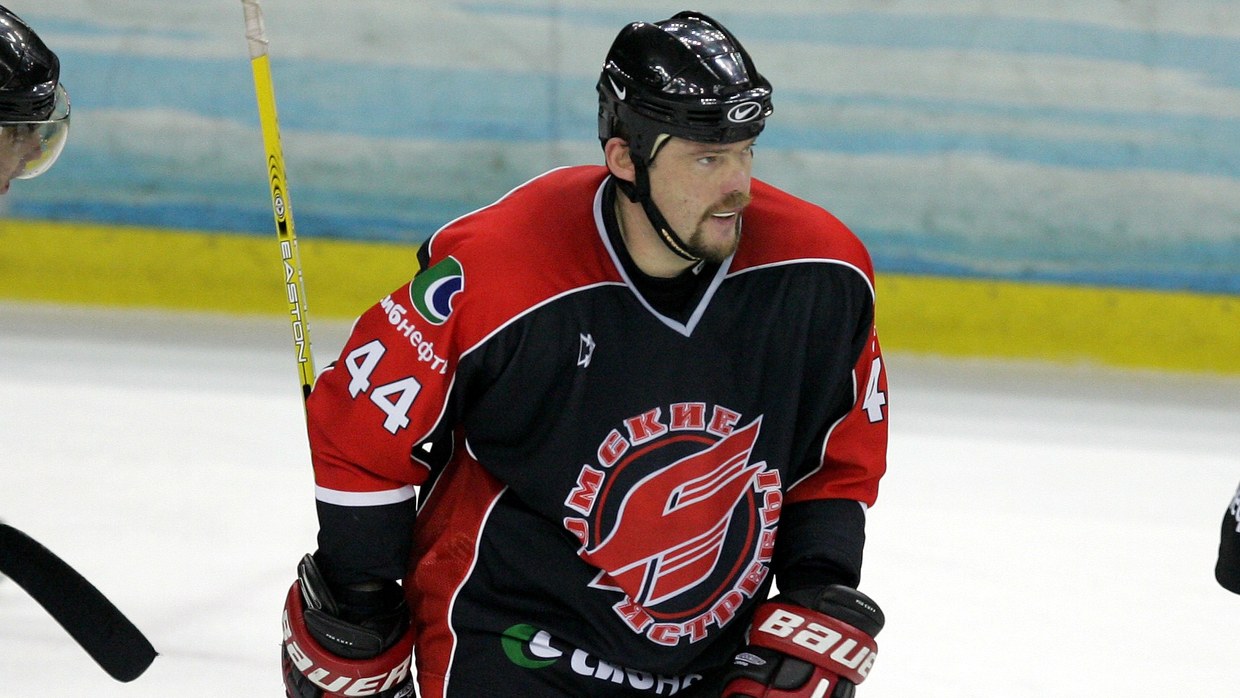
After spending a few months with the team, he gave up his role as Jaromir Jagr’s bodyguard. The Czech is one of ice hockey’s greatest-ever players and was playing for Avangard at the time, and definitely warranted some special protection.
The NHL and what might have been
Over the years, Yudin claimed he was able to beat anyone on the ice, including boxing and mixed martial arts superstars Vitali Klitschko, Lennox Lewis, and even the undefeated Khabib Nurmagomedov. That is something which will never be possible to prove or disprove, although some might lament the fact they never got the chance to see Yudin face off against the best ice hockey enforcers elsewhere in the world. It seemed that Yudin’s style was perfect for the NHL of the '90s and early 2000s, leaving many fans to wonder why he never made it in the biggest league in North America.
Yudin had two attempts to find his place in North American ice hockey. In 1992, he briefly played in the minor professional International Hockey League, and swapped a number of AHL teams in 2000. Most of all, Yudin enjoyed his time with the Providence Bruins, where he crossed paths with Peter Laviolette, Alexander Ovechkin's current coach.
Yudin was greatly impressed by Laviolette’s coaching methods: “He was always coming up with new ideas. For example, $300 for the best bodycheck. Or the same $300 to a player who makes the first six shots to the net. I was stimulated in a special way: Before one of the games he said: 'They have five enforcers. You cannot fight in the first two periods. But then you can fight anyone you want.' So I had to be bludgeoned for 40 minutes. And then he pats me on the shoulder: ‘It’s time…’".
In North America, Yudin had his fair share of adventures. Citing one instance, he has often told the story of how, due to the absence of a visa, he crossed the Canadian border in a large hockey bag. It seems almost impossible to believe, as with many other tales from the defender – after all, even during the years of his playing career, his weight never went lower than 220lbs (100kg). But none of his former teammates or coaches have ever refuted his stories.
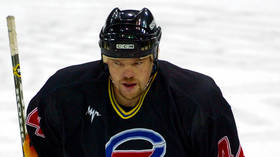
As for Yudin’s overseas career, according to him, the very same Laviolette very soon passed the verdict that the main problem was not the player's skills. “We had an excellent coach – Peter Laviolette, who then started working with the US national team. He looked at me and said: ‘You are an excellent hockey player. Why do you keep such a weak agent?’” Yudin recalled a couple of decades later, but nevertheless at the time he decided to return to his homeland instead of changing his agent.
Scaring off foreign challengers
And yet fate almost presented Yudin with the chance to test himself against one of the best NHL enforcers of all time. In 2004, during a lockout season, Russia’s St. Petersburg hosted an All-Star Game in the Russia vs NHL format. Yudin made it to the national team, while the NHL All-Star team featured the revered Tie Domi. At the time Domi was a living legend in the world of hockey fights: a Canadian of Albanian origin, he had more than 300 brawls in his career and racked up about 3,500 penalty minutes. The numbers were simply staggering.
It also turned out that another infamous enforcer, Marty McSorley, was appointed as coach of the NHL team. During his player career McSorley played the role of bodyguard for the greatest hockey player of all time – Wayne Gretzky – also amassing a staggering 3,400 penalty minutes. So it seemed that a clash between Yudin and Domi was simply inevitable.
Talking to the press ahead of the game, Domi stated that he would look for a fight during the game in Russia, fueling interest in the upcoming battle.
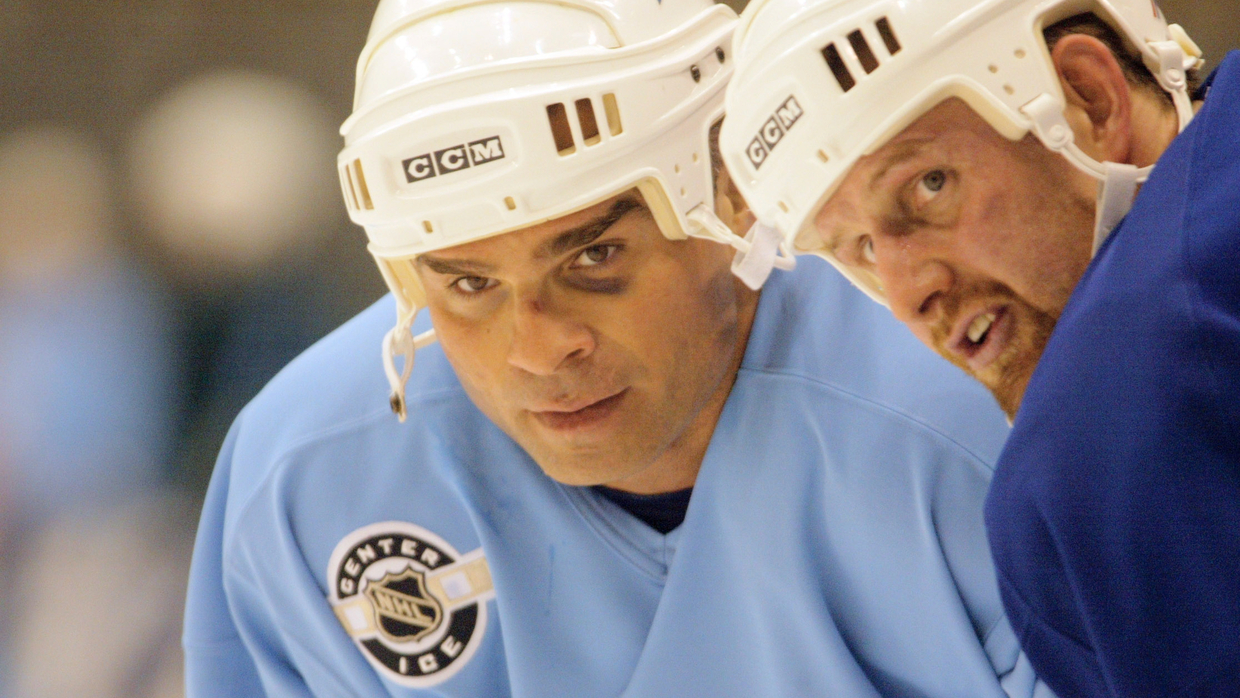
“I am ready to defend my teammates in the game against the NHL players,” replied Yudin through the press. “Surely Domi, following his role, will try to act tough against the host team. But our guys, unlike NHL players, have a season ahead of them. So I am ready to fight back! But it’s good for Domi as he will have someone to fight against. If anything, here I am sitting on the next bench. You don't have to look for too long. Additional intrigue in the game! Let's dance! Perhaps he came to Russia just to relax... Then it is another story. But who knows what he has on his mind?”
As a result, the arena was sold out with fans expecting an almost guaranteed scrap. In the end, however, anyone who came to see a bout between two best enforcers on the planet was left disappointed.
According to Yudin, McSorley and Domi were afraid of fighting him: “At the time I was 120kg (265lbs)! And it was just muscle! McSorley saw such a gorilla – and turned to Domi: ‘Are you ready? There is a guy who is ready for you and he is big’ – ‘How big?’ ‘Awfully big. If you lose, it will be a shame for the NHL…’ So Domi wilted: ‘I came here to rest, I’m not up to it…’ So 3 minutes before the end of the game my coaches told me that the fight was canceled, and I shouldn’t touch Tie Domi.”
‘The New Fetisov’
Another story about Yudin which might seem hard to believe given his reputation: he was an extremely gifted hockey player. The most striking proof is that Yudin was periodically called up to the national team. Perhaps for North American hockey there is nothing surprising in that, but not for Russia, where many have never been able to fully accept the tough guys.
The legendary Boris Mikhailov, who took part in the great Super Series-72, knew Yudin well and in 2002 he took a risk by calling him up for the World Championship. At a Moscow airport before flying to Sweden, Yudin delighted journalists with the phrase “I will kill everyone!”
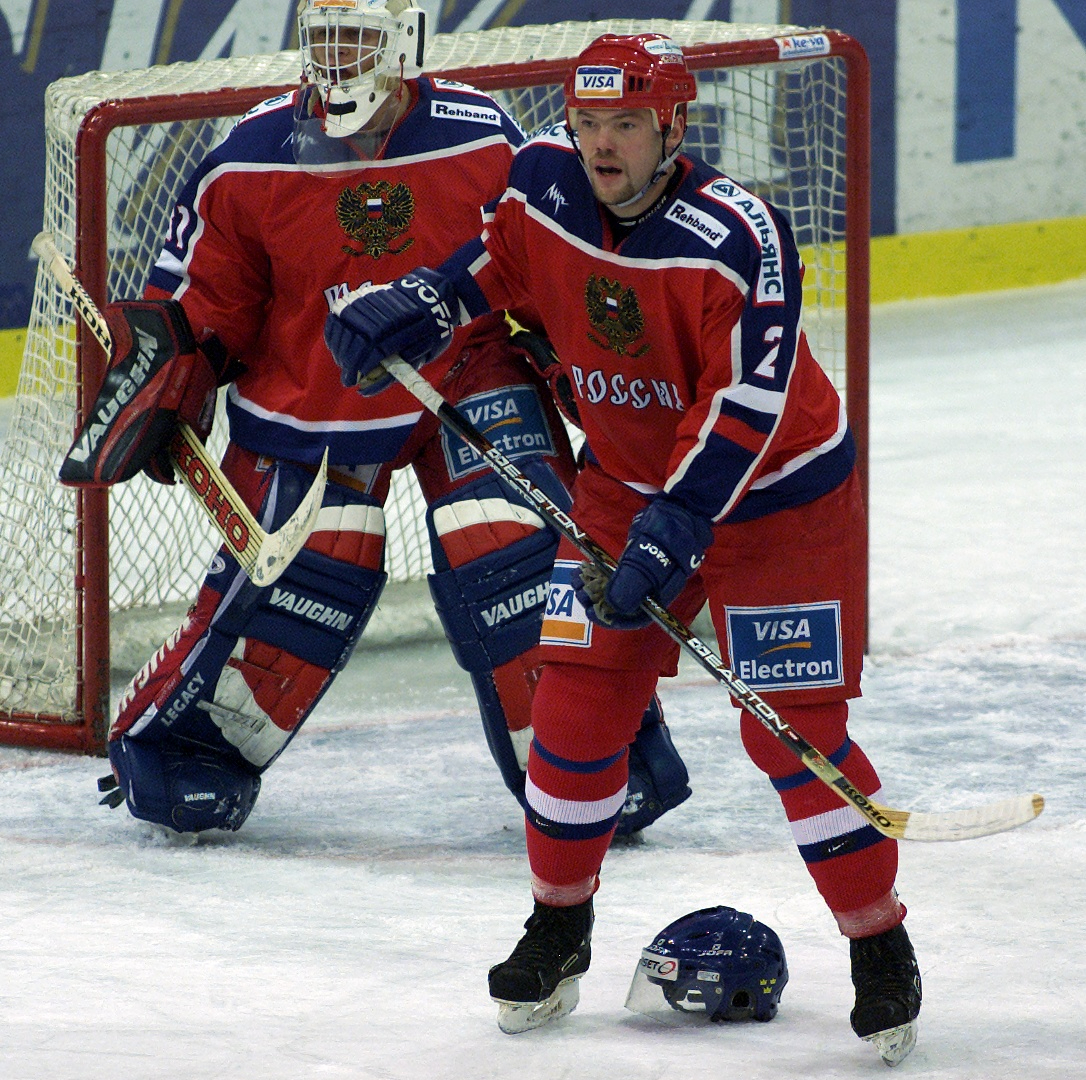
And at the championship itself he unexpectedly repaid his coach for his trust, playing the tournament of his life. In nine games, Yudin earned only six penalty minutes, became a key defenseman and helped an absolutely starless team get to the silver medals. Many years after that World Championship, Yudin would compare himself with the long-term captain of the USSR national team and Detroit Red Wings legend, Vyacheslav Fetisov.
“I was enjoying my own play! For nine games I gave all the passes exactly to the blade, zero percent of the margin. Valeri Karpov took the 44 number [the number Yudin played under almost his entire career], he was the national team veteran. So I didn't get to pick. I took number 2, like Fetisov. And Fetisov himself signed my stick after the championship. That’s when I realized what a talent I had as a passer.”
Business, bankruptcy, coaching
Yudin's life after his hockey career is no less eventful as his days on the ice. While still a professional player, he invested in two businesses at once – a chain of restaurants and a plant for the production of building mixtures.
The hockey star admitted that even in his new ventures he constantly wanted to apply long-established skills, saying: “I want to use my fists all the time. Business is a cruel world. I don’t enjoy it, every day brings me negative emotions. In business, everyone is nervous, and money does not bring any pleasure.”
Restaurants and the plant worked for about 10 years, after which both businesses were shut down. Yudin was unable to find a common language with his partners, some of whom simply deceived the former hockey player. As a result, just three years after his departure from sport, the first Russian enforcer went bankrupt.
Yudin dabbled in politics, but it didn’t work out, and he then decided to return to ice hockey, this time as a coach. Obtaining a license, Yudin defended his coaching diploma on a topic close to his heart: "The advantage of aggressive ice hockey players in achieving a positive result."
Having started working with children, within 10 years the former enforcer had risen to Russia’s main ice hockey league – the KHL. Fate brought him to Russia’s Far East, where he briefly worked as an assistant to the head coach of Khabarovsk Amur.
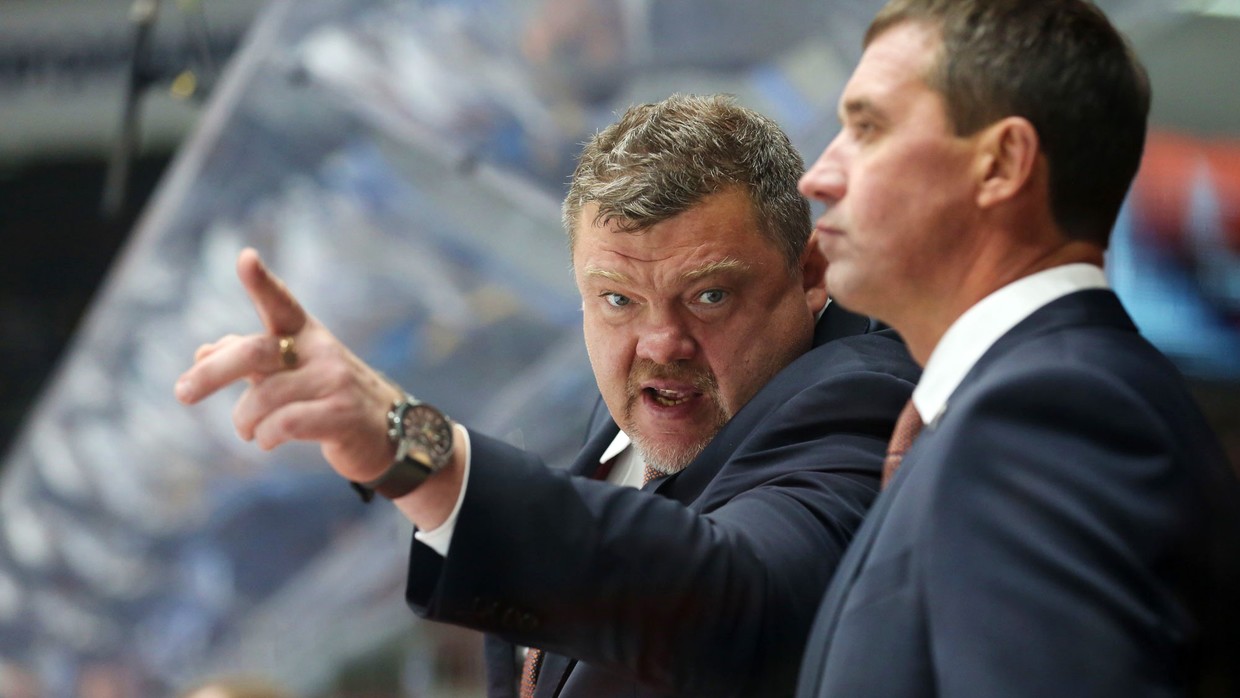
But now aged 51 and unemployed, Yudin only occasionally appears as a hockey pundit in the press. Others in Yudin's shoes may well have given up, but this is not in his nature – instead, he not only intends to return to coaching, but wants to be equal to one of the greatest mentors in the history of ice hockey, Viktor Tikhonov, who won three Olympics and eight world championships with the USSR
“I will definitely become a champion! I want to be like Tikhonov: win 70% of the matches and become the champion ahead of schedule. And show to the rest: ‘Here is the right textbook for you, now you can study. And maybe you can do it too. I am a Viking. A Viking who runs ahead of everyone with an ax!’”
Whenever Yudin is asked what he regrets about his career, he usually answers: "I should have scored more goals." But fans will readily forgive him for such a trivial deficiency – after all, instead of goals, Yudin was the first Russian enforcer who gave the masses an unforgettable era with epic fights, reckless antics, and indelible stories.
Over the years that followed, enforcers have come and gone in Russian hockey, but a new Yudin has still not emerged.












